| Srl | Item |
| 1 |
ID:
123424
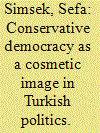

|
|
|
|
|
| Publication |
2013.
|
| Summary/Abstract |
Turkey's Justice and Development Party (AKP), known for its Islamic background, placed itself to the center-right in the political spectrum, and adopted conservative democracy as its new political identity. This study investigates first, what triggers the AKP's strong motivation for conservative democracy; second, what the theoretical foundations and universal validity of this concept are; third, whether and to what extent this concept explains the Turkish reality. It shows that conservative democracy is a cosmetic political image rather than reality within the Turkish context. It also serves as the most elusive and flexible strategy to legitimize the AKP both domestically and internationally.
|
|
|
|
|
|
|
|
|
|
|
|
|
|
|
|
| 2 |
ID:
152663
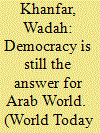

|
|
|
| 3 |
ID:
112442
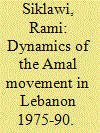

|
|
|
| 4 |
ID:
113362
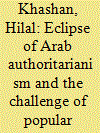

|
|
|
|
|
| Publication |
2012.
|
| Summary/Abstract |
This paper proposes that the tumultuous events associated with the Arab uprisings are unlikely to engender democracy in the foreseeable future. At best, they will probably produce unstable political orders on the basis of accommodation and ad hoc political alliances. The argument of this paper lends itself to analysis through the examination of Arabs' experience with (1) failed reforms, (2) regime defiance, (3) the gap between youth awakening and sociopolitical reality and (4) the uneasy encounter between nascent competence, confidence and political consensus. The author's assessment suggests that recent dramatic developments in the Arab region are only the beginning of a long process of political evolution that is unlikely to be concluded before the successful resolution of the issue of political identity and the transformation of Arab publics from subjects into citizens.
|
|
|
|
|
|
|
|
|
|
|
|
|
|
|
|
| 5 |
ID:
059223
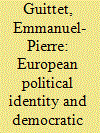

|
|
|
|
|
| Publication |
Aug-Oct 2004.
|
|
|
|
|
|
|
|
|
|
|
|
|
|
|
|
| 6 |
ID:
127155
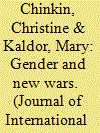

|
|
|
| 7 |
ID:
059434
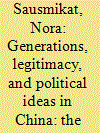

|
|
|
| 8 |
ID:
145632
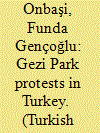

|
|
|
|
|
| Summary/Abstract |
This study aims at a critical analysis of the Gezi Park protests of 2013. Without denying the importance of understanding their ‘before and after,’ it tries to understand what happened ‘during’ the Gezi protests. It argues that the practice of Gezi can be understood via the theory of radical democracy, whose core concepts and premises are particularly appropriate for making sense of what happened during Gezi protests. Drawing on those concepts this study argues that (i) Gezi was a manifestation of the ‘undecidability and contingency of political identities’; (ii) a highly suitable atmosphere developed during the protests for the emergence of a ‘(counter) hegemonic relationship’ in the radical democratic sense of the term; (iii) Kemalism unsuccessfully attempted to act as ‘the nodal point’ to fix the free floating of ideological elements; (iv) ultimately, no particularity managed to take over the representation of ‘the chain of equivalence’ established among the elements excluded from the current neoliberal-conservative hegemony.
|
|
|
|
|
|
|
|
|
|
|
|
|
|
|
|
| 9 |
ID:
147870
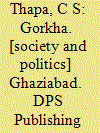

|
|
|
|
|
| Publication |
Ghaziabad, DPS Publishing House, 2016.
|
| Description |
228p.hbk
|
| Standard Number |
9789383046928
|
|
|
|
|
|
|
|
|
|
|
|
Copies: C:1/I:0,R:0,Q:0
Circulation
| Accession# | Call# | Current Location | Status | Policy | Location |
| 058823 | 954.96/THA 058823 | Main | On Shelf | General | |
|
|
|
|
| 10 |
ID:
136710
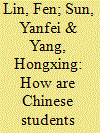

|
|
|
|
|
| Summary/Abstract |
Students have always played an important role in defining the politics of China, and their ideological orientation shapes the nature of student politics. Through a survey of students from six elite universities, this study explores the outlook of Chinese youth’s political identities and analyzes the factors conditioning their identity formation. The results reveal three trends. First, the majority of these college students either claim themselves to be apolitical or to be liberals. Second, among various channels of political (re)socialization, family plays a weak role, while mass media has a strong influence on students’ political orientation. Peking University, the base for nurturing liberals in the 1990s, has now yielded this role to universities specializing in economics and finance, thus suggesting the impact of economic liberalism since the 1990s. Third, gender, education level, academic major, family income, and Communist Party membership are all good indicators of students’ political identities. These results are interpreted in the context of student movements and intellectual transition in China over the past four decades.
|
|
|
|
|
|
|
|
|
|
|
|
|
|
|
|
| 11 |
ID:
116590
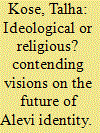

|
|
|
|
|
| Publication |
2012.
|
| Summary/Abstract |
Establishing a coherent collective identity within the modern urban context among people who have different ideological, social and religious orientations, and social and economic backgrounds, is an ongoing struggle within the Alevi community in Turkey. This study tries to understand how alternative positions on Alevi identity dynamically construct the boundaries, moral contents and the new shape of Alevi identity in modern urban contexts through use of various discursive resources. At least two main contending 'positions' on Alevi identity try to institutionalise Alevi identity in modern urban contexts, which are 'Ideological Position' and 'Religious Position'. Those discourse positions constitute different visions about the past and the future of the Alevi community as well as the cultural and the political boundaries of Alevi identity. More importantly, those positions resonate in ordinary citizens' life stories as well as group narratives. This study utilises the analytical frame of 'positioning theory' to shed light on the complexities of identity negotiation.
|
|
|
|
|
|
|
|
|
|
|
|
|
|
|
|
| 12 |
ID:
042348
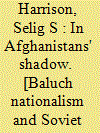

|
|
|
|
|
| Publication |
Washington, Carnegie Endowment for International Peace, 1981.
|
| Description |
xi, 228p.hbk
|
| Standard Number |
0870030299
|
|
|
|
|
|
|
|
|
|
|
|
Copies: C:1/I:0,R:0,Q:0
Circulation
| Accession# | Call# | Current Location | Status | Policy | Location |
| 021566 | 958.1/HAR 021566 | Main | On Shelf | General | |
|
|
|
|
| 13 |
ID:
139178
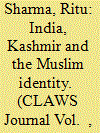

|
|
|
|
|
| Summary/Abstract |
Territory has always played a pivotal role in inter-state rivalry. John A Vasquez has said that the value of territories increases due to their strategic locations, such as if they provide access to the sea or are a source of water. But territories acquire another important dimension if they are home to ethnic and religious communities that form part of the neighbouring state.1 The state of Kashmir presents one such enduring conflict where the separatist demands in the state of Jammu and Kashmir (J&K), coupled with the irredentist claim of Pakistan, have helped in shaping a narrative in India. The popular assumption in India is that ‘Muslim separatism’ got manifested in the form of the country’s partition in 1947 and the prevalent contention is that Muslims had a choice of political identity but they chose one based on religion.2 This has resulted in an unintended linking of the Kashmiris’ demand for greater autonomy or a separate state with the identity of Muslims in the rest of India.
|
|
|
|
|
|
|
|
|
|
|
|
|
|
|
|
| 14 |
ID:
118613
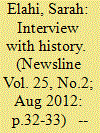

|
|
|
| 15 |
ID:
067784
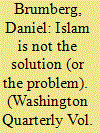

|
|
|
| 16 |
ID:
132738
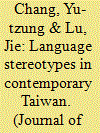

|
|
|
|
|
| Publication |
2014.
|
| Summary/Abstract |
We collected original experimental data, using the matched-guise technique, to examine the Taiwanese people's evaluational reactions to two major spoken languages in contemporary Taiwan: Mandarin and Taiwanese. Taking advantage of the effectiveness of the experimental technique in controlling for possible unobserved confounding variables, we clearly and systematically demonstrate that (1) language stereotypes do exist in today's Taiwan, and (2) there are some serious and significant implications for Taiwan's public opinion and democratic politics. Our data show that such language stereotypes are of great salience and consistently decoded for political issues, less so for socioeconomic issues, and almost insignificant for personality features. Our data also confirm that these language stereotypes are not just proxies of Taiwan's regional divisions; the Taiwanese people cognitively differentiate between the spoken languages' political and socioeconomic implications (despite some mild halo effect between the two).
|
|
|
|
|
|
|
|
|
|
|
|
|
|
|
|
| 17 |
ID:
149431
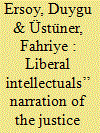

|
|
|
|
|
| Summary/Abstract |
This article examines the relationship between a specific group of intellectuals and political power in recent Turkish political history. This group of ‘liberal intellectuals’ demonstrated constant support for the conservative Justice and Development Party (AKP) governments in the 2002–2010 period, although after 2010, some of these former staunch supporters became fierce critics of the party. The changing circumstances of this relationship shows that a sense of distinction determines the manner in which ‘liberal intellectuals’ present the AKP, being based on their potential emergence as guides and actors in the ‘New Turkey.’ This study aims to contextualize and identify the definitive moments in the relationship between this body of ‘liberal intellectuals’ and the AKP in the 2002–2015 period by examining their narrative directed towards the party in power.
|
|
|
|
|
|
|
|
|
|
|
|
|
|
|
|
| 18 |
ID:
106278
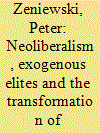

|
|
|
| 19 |
ID:
166661
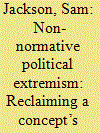

|
|
|
|
|
| Summary/Abstract |
Political extremism suffers from a definitional deficiency. This article proposes an analytical definition of the term, which avoids using extremism in a pejorative way. This definition also avoids exclusive focus on violence. This definition encourages the analyst to explicitly make the case for defining an action or an actor as extremist by comparing the action or actor to its political context. The article then explores several dimensions of an extremist political identity that can help observers understand extremist behavior and goals. It uses this conceptual framework to consider three examples of political extremism. Finally, the article concludes with some limitations and strengths of this definition of political extremism.
|
|
|
|
|
|
|
|
|
|
|
|
|
|
|
|
| 20 |
ID:
105628
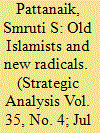

|
|
|
|
|
| Publication |
2011.
|
| Summary/Abstract |
The new radicals in Pakistan have challenged the old Islamists as represented by the religious political parties on the nature of state and the means to capture state power. These new radicals reject the 'bottom up' approach followed by the traditional Islamic political parties and prefer a 'top down' approach. Their ideological inspiration and reference point is Afghanistan under Taliban. This paper explores the relationship between the state and Islamists historically and examines how the state initiated Islamisation, in the process giving birth to new radicals that cashed in on the state's failure and posed an ideological challenge to the Pakistani state.
|
|
|
|
|
|
|
|
|
|
|
|
|
|
|
|